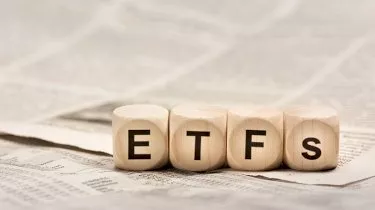Invest
Pros and cons of investing in ETFs
Investing in exchange traded funds (ETFs) has become big money – growing to a domestic investment tool worth $50 billion.
Pros and cons of investing in ETFs
Investing in exchange traded funds (ETFs) has become big money – growing to a domestic investment tool worth $50 billion.

While investors enjoy the convenience of ETFs, many are still unaware how they work and why they should be used as part of a balanced portfolio.
During Bloomberg’s annual ETF conference, fund leaders explained the pros and cons of investing in ETFs.
Pros of ETFs
Gaining exposure to untouched markets

Previously untouched markets which were difficult to access or had complex tax laws have previously kept investors out of emerging markets.
An ETF allows investors to bypass these issues and gain exposure to some of the fastest-growing countries in the world, including India and China, which topped growth worldwide last year.
Head of product strategy at Vanguard Australia Balaji Gopal said “getting access to emerging markets is best done through a diversified exposure through an ETF channel”.
Hedge against downturns
If investors wanted to buy hedges against the market using commodities such as gold, investors previously had to buy the physical asset.
In the past, no matter which way an investor wanted to purchase gold, it would lose them money, whether it was buying at a premium, selling at a discount or paying for the physical storage of the asset.
For Kris Walesby from ETF Securities, “gold was hard to access for anyone that wasn’t an institution”.
“The gold ETF was the perfect form of capturing wholesale institutional price gold in a wrapper.”
Cheaper fees
Fees continue to drop aggressively across the passive products, with some ETF providers offering up zero-fee products.
“The cost of investing across the board is coming down, with the big winners being investors,” Mr Gopal said.
However, he did argue that zero-cost ETF can’t be long-term options due to fees associated with setting up the fund.
At some point, whether it is the price or the ETF or in a fee for maintaining the fund, the investor will have to pay for the product.
Cons of ETFs
Investors only read the title
While the panel highlighted the downside to ETFs have fallen as the product has improved, downsides to the asset class remain.
Kris Walesby said that while not an issue with the product itself, investors often only read the title and believe they understand the underlying asset due to the simplicity of the asset class.
Investors are reading the label and assuming they know what the product is about, rather than reading what stocks the fund is actually invested in.
Passive funds
The fund manager who famously predicted the US mortgage market’s flaws and corruptness believes ETFs face potential issues with passive investing.
Michael Burry argued that price discovery issues, or the process of determining the prices of an asset through the interactions of buyers and sellers, might be disturbed due to ETFs.
The panel did not share Mr Burry’s views, instead arguing price discovery issues cannot occur due to funds tracking the index and being not involved in moving prices through trading volume.
The second point Mr Burry has argued is the disconnect between the client and the market. The client will simply expect to sell the ETF, but the middle man that is the ETF provider won’t be able to cover themselves.
Who knows who will take the fall? Will it be the ETF seller, or the ETF provider?
The panel again disagreed due to the fund tracking the index, meaning that while everyone is going for the exit, the ETF itself won’t sell. It’s only the active management community that sells off.
Finally, Mr Burry has separately argued that the excessive use of derivatives in ETFs could increase the risk profile of such investments.
The panel did agree with this, as does the Australian government, having noted ASIC’s call for a review into the sector and a halt of new assets.
CIO of Implemented Portfolio Jon Reilly commented that “if you’re expecting exchange traded funds to give you more liquidity, then you’re deluding yourself”.
“What would happen if everyone wanted out?”
He said, “of course, we are going to have disruptions”, but it’s not just the ETF holders, in his opinion.
ETFs are moving markets
The panel went on to consider capital inflows and how it is having an impact on the market.
“In the US, ETFs are a quarter of trading, but ETFs are visible [and] transparent so people can point at them and say these are the bad guys because I can see what’s happening, but even basic maths shows you that three-quarters of market activity is moving the market much more,” Kris Walesby said.
However, in Australia the ETF market is only 5 per cent of the total trades, making it just a small fraction of the overall market.
“If you look at the people who generally say this, they are normally active managers, and if they believed this, they would be cheering for more because they could outperform them,” Mr Walesby said.
Learn more about ETF's shares and how they are taxed.
About the author

About the author


Mutual funds
Mutuals profits rise amid sector challenges: KPMG report highlights growth and merger trends
Australia's mutual banks, building societies, and credit unions, collectively known as Mutuals, have reported a significant rise in profits for the 2025 financial year, according to KPMG's 38th Mutual ...Read more

Mutual funds
EIF and NATO Innovation Fund partner to boost European defence and security investment
The European Investment Fund (EIF) and NATO Innovation Fund (NIF) have signed a Memorandum of Understanding to collaborate on expanding funding for start-ups, SMEs and midcaps in Europe's defence, ...Read more

Mutual funds
Fund managers brace for regulatory challenges as outsourcing and innovation take centre stage
As regulatory complexities continue to mount, fund managers are increasingly turning to outsourcing and prioritising innovation to navigate the challenging landscape, according to a new study by Carne ...Read more

Mutual funds
New report highlights rising anti-money laundering risks and need for three lines of defence
A new report published by Ocorian and Newgate Compliance has warned that rising anti-money laundering (AML) risks are increasing the pressure for alternative fund managers to have three lines of ...Read more

Mutual funds
Centuria capitalises on non-core diversities with a new $50 million fund
The Centuria Capital Group, an established Australasian real estate fund manager, has successfully raised $50 million in equity from its network of Australian wholesale investors. Read more

Mutual funds
New study shows fund managers are eyeing overseas markets for capital growth
A recent study conducted by Carne Group, a prominent figure in the fund regulation and governance solutions sector for the asset management industry, has highlighted a significant shift in the ...Read more

Mutual funds
Equity Trustees reports robust performance with significant revenue and profit growth
Equity Trustees has witnessed a noteworthy advancement in its financial standing, marked by substantial increases in revenue and funds under management, administration, and supervision (FUMAS), ...Read more

Mutual funds
Micro-investing: Is it worth it?
Investing can be complex. It involves making financial decisions on how your money is going to be invested and managed over time, as well as figuring out the right strategy for each investment. There ...Read more

Mutual funds
Mutuals profits rise amid sector challenges: KPMG report highlights growth and merger trends
Australia's mutual banks, building societies, and credit unions, collectively known as Mutuals, have reported a significant rise in profits for the 2025 financial year, according to KPMG's 38th Mutual ...Read more

Mutual funds
EIF and NATO Innovation Fund partner to boost European defence and security investment
The European Investment Fund (EIF) and NATO Innovation Fund (NIF) have signed a Memorandum of Understanding to collaborate on expanding funding for start-ups, SMEs and midcaps in Europe's defence, ...Read more

Mutual funds
Fund managers brace for regulatory challenges as outsourcing and innovation take centre stage
As regulatory complexities continue to mount, fund managers are increasingly turning to outsourcing and prioritising innovation to navigate the challenging landscape, according to a new study by Carne ...Read more

Mutual funds
New report highlights rising anti-money laundering risks and need for three lines of defence
A new report published by Ocorian and Newgate Compliance has warned that rising anti-money laundering (AML) risks are increasing the pressure for alternative fund managers to have three lines of ...Read more

Mutual funds
Centuria capitalises on non-core diversities with a new $50 million fund
The Centuria Capital Group, an established Australasian real estate fund manager, has successfully raised $50 million in equity from its network of Australian wholesale investors. Read more

Mutual funds
New study shows fund managers are eyeing overseas markets for capital growth
A recent study conducted by Carne Group, a prominent figure in the fund regulation and governance solutions sector for the asset management industry, has highlighted a significant shift in the ...Read more

Mutual funds
Equity Trustees reports robust performance with significant revenue and profit growth
Equity Trustees has witnessed a noteworthy advancement in its financial standing, marked by substantial increases in revenue and funds under management, administration, and supervision (FUMAS), ...Read more

Mutual funds
Micro-investing: Is it worth it?
Investing can be complex. It involves making financial decisions on how your money is going to be invested and managed over time, as well as figuring out the right strategy for each investment. There ...Read more








